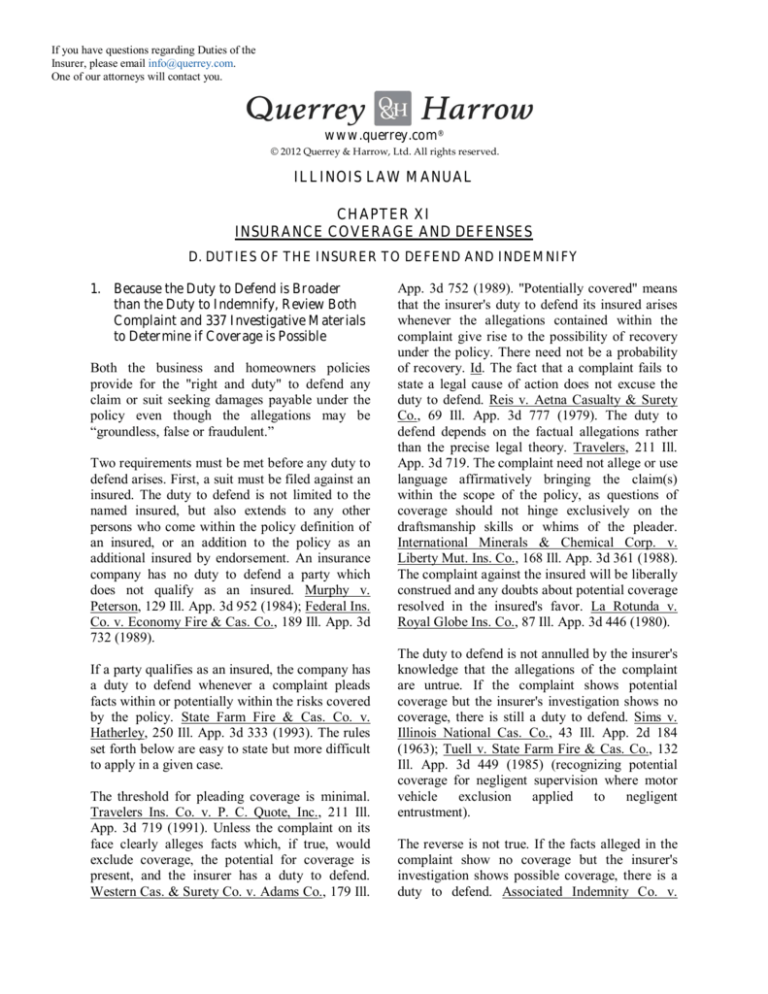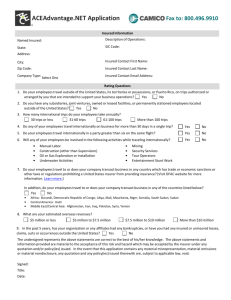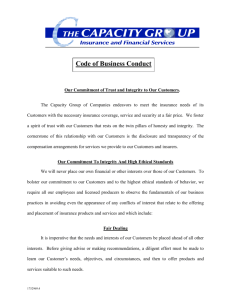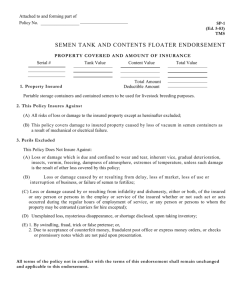
If you have questions regarding Duties of the
Insurer, please email info@querrey.com.
One of our attorneys will contact you.
www.querrey.com®
© 2012 Querrey & Harrow, Ltd. All rights reserved.
ILLINOIS LAW MANUAL
CHAPTER XI
INSURANCE COVERAGE AND DEFENSES
D. DUTIES OF THE INSURER TO DEFEND AND INDEMNIFY
1. Because the Duty to Defend is Broader
than the Duty to Indemnify, Review Both
Complaint and 337 Investigative Materials
to Determine if Coverage is Possible
Both the business and homeowners policies
provide for the "right and duty" to defend any
claim or suit seeking damages payable under the
policy even though the allegations may be
“groundless, false or fraudulent.”
Two requirements must be met before any duty to
defend arises. First, a suit must be filed against an
insured. The duty to defend is not limited to the
named insured, but also extends to any other
persons who come within the policy definition of
an insured, or an addition to the policy as an
additional insured by endorsement. An insurance
company has no duty to defend a party which
does not qualify as an insured. Murphy v.
Peterson, 129 Ill. App. 3d 952 (1984); Federal Ins.
Co. v. Economy Fire & Cas. Co., 189 Ill. App. 3d
732 (1989).
If a party qualifies as an insured, the company has
a duty to defend whenever a complaint pleads
facts within or potentially within the risks covered
by the policy. State Farm Fire & Cas. Co. v.
Hatherley, 250 Ill. App. 3d 333 (1993). The rules
set forth below are easy to state but more difficult
to apply in a given case.
The threshold for pleading coverage is minimal.
Travelers Ins. Co. v. P. C. Quote, Inc., 211 Ill.
App. 3d 719 (1991). Unless the complaint on its
face clearly alleges facts which, if true, would
exclude coverage, the potential for coverage is
present, and the insurer has a duty to defend.
Western Cas. & Surety Co. v. Adams Co., 179 Ill.
App. 3d 752 (1989). "Potentially covered" means
that the insurer's duty to defend its insured arises
whenever the allegations contained within the
complaint give rise to the possibility of recovery
under the policy. There need not be a probability
of recovery. Id. The fact that a complaint fails to
state a legal cause of action does not excuse the
duty to defend. Reis v. Aetna Casualty & Surety
Co., 69 Ill. App. 3d 777 (1979). The duty to
defend depends on the factual allegations rather
than the precise legal theory. Travelers, 211 Ill.
App. 3d 719. The complaint need not allege or use
language affirmatively bringing the claim(s)
within the scope of the policy, as questions of
coverage should not hinge exclusively on the
draftsmanship skills or whims of the pleader.
International Minerals & Chemical Corp. v.
Liberty Mut. Ins. Co., 168 Ill. App. 3d 361 (1988).
The complaint against the insured will be liberally
construed and any doubts about potential coverage
resolved in the insured's favor. La Rotunda v.
Royal Globe Ins. Co., 87 Ill. App. 3d 446 (1980).
The duty to defend is not annulled by the insurer's
knowledge that the allegations of the complaint
are untrue. If the complaint shows potential
coverage but the insurer's investigation shows no
coverage, there is still a duty to defend. Sims v.
Illinois National Cas. Co., 43 Ill. App. 2d 184
(1963); Tuell v. State Farm Fire & Cas. Co., 132
Ill. App. 3d 449 (1985) (recognizing potential
coverage for negligent supervision where motor
vehicle
exclusion
applied to
negligent
entrustment).
The reverse is not true. If the facts alleged in the
complaint show no coverage but the insurer's
investigation shows possible coverage, there is a
duty to defend. Associated Indemnity Co. v.
Insurance Co. of North America, 68 Ill. App. 3d
807 (1979). The insurer cannot safely ignore
unpleaded facts within its knowledge, which it
knows to be correct, and which, when taken
together with the allegations, indicate that the
claim asserted against the insured is potentially
within coverage. The duty to defend exists even
where the pleadings allege several causes of
action or theories of recovery, only one of which
falls within coverage under the policy. This is
based on the oft-quoted principle that the duty to
defend is broader than the duty to indemnify.
Tuell, 132 Ill. App. 3d 449.
defenses, including late notice, even if a defense
would have otherwise barred coverage. Employers
Ins. Co. of Wausau v. Ehlco Liquidating Trust,
186 Ill. 2d 127 (1999). An insurer does not have
an unlimited amount of time in which to file a
declaratory judgment action. It must do so within
a reasonable time after the tender of defense, and
in no event may it wait until after the underlying
action is resolved. West American Insurance
Company v. J.R. Construction, 334 Ill. App. 3d 75
(2002).
As set forth more fully below, once a company
has unjustifiably failed to defend, the insurer not
only is prevented from raising policy defenses, it
also has liability for:
An insurer in a declaratory judgment action may
introduce evidence outside of the policy and
underlying complaint in certain circumstances.
Charles Eichelkraut & Sons, Inc. v. Bituminous
Casualty Co., 166 Ill. App. 3d 550 (1988).
Evidence beyond the policy and complaint is
admissible to show that a claim is not covered if
the evidence does not bear on an ultimate issue of
fact in the underlying action, so that a court
presiding over a declaratory judgment action will
not make a factual finding which may have a
preclusive effect in the underlying action.
(1) the amount of the judgment rendered
against the insured or for the amount
of the settlement;
(2) expenses incurred by the insured in
defending the suit; and
(3) any additional expenses caused by the
breach of the insurance contract.
2. The Effect of an Unjustified Refusal
to Defend: A Carrier is Barred from
Raising Policy Defenses in a Later Action
Following Judgment or Settlement
Conway v. Cas. Ins. Co., 92 Ill. 2d 388 (1982).
However, this does not necessarily mean that the
company is liable for more than its policy limits.
Unless the insurer has acted in bad faith by
refusing to defend its insured (or by failing to act
reasonably to settle a claim within its policy
limits), it is not liable for that portion of the
judgment or settlement in excess of its policy
limits. Aetna Cas. & Surety Co. v. Coronet Ins.
Co., 44 Ill. App. 3d 744 (1976).
Where an insurer believes that a policy does not
provide coverage to an insured, for a lawsuit, the
insurer must either defend the suit under a
reservation of rights or secure a declaratory
judgment as to coverage obligations before trial or
settlement of the underlying action. Casualty Ins.
Co. v. Northbrook Property & Cas. Ins. Co., 150
Ill. App. 3d 472 (1986). Where the insurer fails to
do either, its failure to defend, if incorrect, is
unjustified, and it may be estopped to raise policy
defenses in a later action by the insured or the
insured's subrogee or assignee. Reis, 69 Ill. App.
3d 777.
By wrongfully refusing to defend, the company
loses the right to control the defense and cannot
take advantage of a clause prohibiting the insured
from settling without the company's permission.
Krutsinger v. Illinois Cas. Co., 10 Ill. 2d 518
(1957). Also, the insured is released from the duty
to comply with the condition that it pay the
judgment before bringing a direct action (Kinnan
v. Charles B. Hurst Co., 317 Ill. 251 (1925)), and
from the obligation to cooperate with the
company and assist in the defense. Coulter v.
The Illinois Supreme Court has clarified that if an
insurer does not either defend a lawsuit under a
reservation of rights or file a declaratory action
before the underlying action is resolved, the
insurer will be barred from raising any coverage
-2-
American Employers Ins. Co., 333 Ill. App. 631
(1948).
In Zurich Ins. Co. v. Raymark Industries, Inc., 118
Ill. 2d 23 (1987), the Illinois Supreme Court held
that carriers had no duty to defend other claims in
the same suit following the payment of judgments
and settlements which exhausted policy limits, as
its withdrawal from the defense was orderly and
there were other co-insurers which were
defending the claim against the insured. In other
words, where the insurer has no potential
obligation to indemnify once it has exhausted its
limits by payment of other claims, it has no duty
to defend remaining claims in the same action.
As also set forth more fully below, an unjustified
refusal to defend does not arise where the refusal
to defend is based upon a conflict of interest.
Further, an insurer has not unjustifiably refused to
defend where it has offered a defense under a
reservation of rights, but the insured rejects the
reservation of rights. Where coverage is in
question, the insurer is not required to provide an
unconditional defense. Pekin Ins. Co. v. Home
Ins. Co., 134 Ill. App. 3d 31 (1985).
4. The Duty to Defend Includes the Duty to
Hire Counsel and the Right to Control the
Litigation
The lack of prejudice to the insured is not a
defense available to an insurer which has
unjustifiably refused to defend. The contract is no
less breached because of the fortuitous existence
of another carrier which meets its own
obligations. Cas. Ins. Co. v. United States Fidelity
& Guaranty Co., 150 Ill. App. 3d 479 (1986).
The policies not only give the company the "right
and duty" to defend, but also to "settle any claim
or suit" at its discretion. Under the terms of the
policy, the insurer has the complete control of the
litigation for which it might have a duty to
indemnify. River Valley Cartage Co. v. Hawkeye
Security Ins. Co., 17 Ill. 2d 242 (1959). Under
limited circumstances where certain conflicts of
interest arise, the insurer may be required to give
up control of the defense to its insured. This is
more fully addressed in Section H of this chapter.
3. The Effect of Exhaustion of Policy Limits
by Payment of Judgment(s)
or Settlement(s) May Relieve the Insurer of
Any Further Duty to Defend
Most policies contain a standard clause which
provides that the "right and duty to defend" ends
when the company has used up the applicable
limit of insurance in the payment of judgments or
settlements. The Illinois Supreme Court has
limited this clause to relieve the insurer of the
obligation to defend only where payment was
made pursuant to a judgment or settlement which
terminated the litigation against the insured. In
Conway, 92 Ill. 2d 388, the court rejected the
company's contention that its payment of its
$10,000 policy limit to a claimant discharged its
duty to defend its insured where that payment did
not end the litigation, since otherwise the insurer
could essentially buy out its duty to defend by
tendering its policy limits where the payment was
not pursuant to either a judgment or a settlement.
This situation is to be distinguished from Oda v.
Highway Ins. Co., 44 Ill. App. 2d 235 (1963),
where it was held that the insurer did not have to
defend a second action arising out of the same
incident where it had already exhausted its
liability limits in concluding an earlier action.
The right to control the litigation has been referred
to as the consideration for the insurer's duty to
defend the insured against all suits within the
scope of the policy, even if the suit is groundless,
false, or fraudulent. In return, the law places upon
the insurer the duty of giving the interests of the
insured equal consideration with its own interests
and dealing fairly with the insured, as set forth
more fully in Chapter XIII.
Except where there is a conflict of interest as
described in Section H, the insurer has the right to
select the attorney who will defend the insured in
the underlying litigation. Brocato v. Prairie State
Farmers Ins. Ass'n., 166 Ill. App. 3d 986 (1986).
This is a contractual right founded on the theory
that, because the insurance company's money is
used to pay a judgment, it should have the right to
choose an attorney in whom it has confidence. If
the insured wants to retain his own attorney for
further protection, usually when the potential
value of the suit exceeds the limits of the policy or
-3-
5. The Duty to Indemnify May Include the
Accrual of Post-Judgment Interest on the
Entire Judgment and Costs
where punitive damages are sought, it is at the
insured's own expense. An insurer is not required
to pay attorney's fees to counsel hired by the
insured to guard against a judgment in excess of
insured's policy limits where the insurer has not
by its actions forced the insured to engage its own
attorneys. Reis, 69 Ill. App. 3d 777.
The homeowners and business policies both
provide that the amount that the company “will
pay for damages is limited as described in Limits
of Insurance.” The duty to pay is simple: the
company must pay any judgment entered against
the insured resulting from a loss covered by the
policy up to the amount of the limits of liability
for the coverage afforded.
Although the carrier has control of the defense, it
does not have a license to act unreasonably. The
question of cooperation involves the good faith of
the insured as well as the insurer. State Farm Fire
& Cas. Co. v. First National Bank & Trust Co. of
Pekin, 2 Ill. App. 3d 768 (1972). This does not
include the right to control or supervise the actual
conduct of any litigation since the carrier cannot
practice law, and once it hires an attorney, any
complaints the insured might have about the
conduct of litigation must be directed to the
attorneys themselves. Brocato, 166 Ill. App. 3d
986.
Many insurance policies are "liability" rather than
"indemnity" policies. Whereas an "indemnity"
policy provides indemnity against loss but
requires the insurer to make payment to the
insured only after the insured has paid or been
compelled to pay a claim, the "liability" policy
shields the insured from the requirement of
making any payment on a claim for liability
imposed by law.
An attorney, even though chosen and paid by the
carrier, owes the insured the same obligation of
fidelity and good faith that he would owe had the
insured retained him personally and must disclose
to the insured those facts and circumstances which
might be likely to affect the performance of that
duty. Allstate Ins. Co. v. Keller, 17 Ill. App. 2d 44
(1958); Carito v. Allstate Ins. Co., 194 Ill. App.
3d 767 (1990).
In addition to the limit of insurance, the company
also agrees to pay with respect to any claim or suit
which it defends certain claim expenses,
including:
(1) costs taxed against the insured;
(2) the cost of bonds in amounts not
greater than the limits of insurance;
If there is no duty to defend, there is no duty to
indemnify. Hatherley, 250 Ill. App. 3d 333.
(3) prejudgment interest awarded against
the insured on that part of the
judgment that the company pays; and
The right and duty to control the defense also
includes the right and duty to settle an action.
Illinois courts have long recognized that an
insurer has a duty to its insured to act reasonably
to settle a claim within the available policy limits
if there is a reasonable opportunity to do so,
coupled with a potential that the value of the
claim may exceed the available limits. Cramer v.
Insurance Exchange Agency, 174 Ill. 2d 513
(1996). More recently, courts have recognized that
this duty to settle runs not only to the insured, but
also to any excess insurer. Schal Bovis, Inc. v.
Casualty Ins. Co., 314 Ill. App. 3d 562 (2000).
(4), interest on the entire judgment which
accrues after the entry of judgment
and before the company pays or
tenders payment or deposits in court
that part of the judgment which does
not exceed the limit of liability that
applies.
-4-
6. Tender Must Include Post-Judgment
Interest on Judgment in Full Amount
7. “Costs” Include Attorney Fees Assessed
Against Insured in Prevailing Party's Favor
If the company tenders only the face amount of
the policy and interest only on the amount of the
policy rather than post-judgment interest on the
entire judgment, the tender is not valid to
terminate the continuing obligation for interest on
the entire judgment. River Valley, 17 Ill. 2d 242.
A primary insurer whose policy agreed to pay
post-judgment interest is likewise not relieved of
this obligation by the fact that an excess policy
covered part of the ultimate loss. Hartford
Accident & Indemnity Co. v. Aetna Ins. Co., 132
Ill. 2d 79 (1989).
“Costs”include attorney's fees charged against the
insured in a suit which the company defends.
Argento v. Village of Melrose Park, 838 F.2d
1483 (7th Cir. 1988). This is true even where
there is no duty to indemnify the insured for the
judgment. Littlefield v. McGuffey, 979 F.2d 101
(7th Cir. 1992).
Querrey & Harrow, Ltd.
175 W. Jackson Blvd., Chicago, IL 60604
312-540-7000
www.querrey.com
-5-








